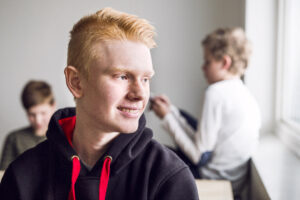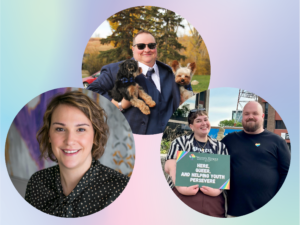By Dr. Angelique Jenney, Wood’s Homes Research Chair in Children’s Mental Health, and Olivia Cullen and Laura Shiels, Youth Co-Researchers.
We recently recognized Mental Health Week and Child and Youth Mental Health Day this month, and we can’t think of a better thing to talk about than how youth can be part of the solution to improving our systems of support and intervention.
Recently, we’ve been fortunate to have had the opportunity to work together with an incredible group of graduate students and youth co-researchers (all co-authors on this blog post) to consider approaches to clinical work with youth.
We got to sit in a virtual room and hear from youth about what they want and need from the adult mental health supports in their lives.
Together the youth created a road map with a list of green flags for adult therapists that can help them be more youth-focused. They created a useful infographic suggesting key components such as support people who are transparent, person-centered, authentic and flexible and provided specific tips for what this could look like here.
We also had the opportunity to learn together about how to optimize the involvement of youth in research projects for and about youth. Some of the take-aways for potential researchers:
- First and foremost, listen to youth voices!
- Prioritize, rather than tokenize youth voices. Youth were valued in this project by being paid for their time – and they let us know that pizza and a gift card just doesn’t cut it when it comes to valuing lived expertise.
- Set up the conditions for success, with strategies for engagement that are both collaborative and transparent
- Ensure mental wellness is at the core of any approach (consider the potential for triggers or life changes throughout the work). For example, ask youth what would support them if at any time during the process they experience a change in safety both within or outside of the project itself.
Finally, as a collaborative whole we worked together to create knowledge and resources for other youth and the professionals who want to provide optimal opportunities either within the therapeutic relationship or as co-researchers on issues important to youth mental health.
What we learned together changed all of us. And since we believe in the power of voice, you can hear from us directly on this podcast!




